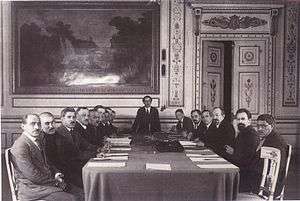Treaty of Moscow (1921)
The Treaty of Moscow, or Treaty of Brotherhood (Turkish: Moskova Antlaşması, Russian: Московский договор) was an agreement between the Grand National Assembly of Turkey (TBMM), under the leadership of Mustafa Kemal Atatürk, and Russia, under the leadership of Vladimir Lenin, signed on 16 March 1921.[1][2][3] Neither the Republic of Turkey nor the Soviet Union had been established at the time. The internationally-recognised Turkish government at the time was that of Sultan Mehmed VI, but it was not party to the Treaty of Moscow. The Sultan's government had signed the Treaty of Sèvres, which had been repudiated by the Turkish National Movement.
 Turkish committee members Rıza Nur, Yusuf Kemal Tengirşenk, Ali Fuat Cebesoy together with Russian members Georgy Chicherin and Celalettin Korkmazov | |
| Type | Peace Treaty |
|---|---|
| Signed | 16 March 1921[1] |
| Location | Moscow, Russian SFSR |
| Condition | Ratification |
| Signatories | |
| Languages | Russian, French |
Under the Treaty of Moscow, the two governments undertook to establish friendly relations between the countries.[4] The treaty stipulated that the term "Turkey" in it meant the territories included in the National Oath, adopted by the Ottoman Parliament on 28 January 1920. Article VI declared all the treaties that had been concluded between Russia and Turkey to be null and void; under Article II, Turkey ceded Batum and the adjacent area north of the village of Sarp to Georgia (the Kars Oblast went to Turkey); Article III instituted an autonomous Nakhichevan district under Azerbaijan's protectorate; under Article V, the parties agreed to delegate the final elaboration of the status of the Black Sea and the Straits to a future conference of delegates of the littoral states provided that the "full sovereignty" and security of Turkey and "her capital city of Constantinople" were not injured.[1]
Turkey's borders, as well as those of Georgia, Armenia and Azerbaijan, as defined by the treaty as well as the nearly-identical Treaty of Kars (signed on October 13, 1921), are still in existence.
After the shootdown of the Russian Sukhoi Su-24 over the Syria–Turkey border in November 2015 and the rise of Russian–Turkish relations, members of the Communist Party of Russia proposed annulling the Treaty of Moscow.[5][6] Initially, the Russian Foreign Ministry considered this action in order to send a political message to the government of Turkish President Recep Tayyip Erdoğan.[5] However, Moscow ultimately decided against the idea in its effort to de-escalate tensions with Ankara.[7]
References
- (in Russian) Московский договор между Росскией и Турцией, 16 марта 1921 года Archived 2007-09-28 at the Wayback Machine
- Tsutsiev, Arthur (2014). Atlas of the Ethno-Political History of the Caucasus. Translated by Nora Seligman Favorov. New Haven: Yale University Press. p. 79. ISBN 978-0300153088.
- King, Charles (2008). The Ghost of Freedom: A History of the Caucasus. Oxford: Oxford University Press. p. 189. ISBN 978-0195177756.
- (in Russian) Документы внешней политики СССР. Moscow, 1959, Vol. III, pp. 597-604.
- Shakarian, Pietro A. (17 February 2016). "Will Russia cancel its 1921 friendship treaty with Turkey?". Russia Direct. Retrieved 24 March 2017.
- Lomsadze, Giorgi (10 February 2016). "Russian Communists Want to Scrap Historic Treaty with Turkey". EurasiaNet. Retrieved 24 March 2017.
- "RF MFA's letter on impossibility of dissolution of friendship Treaty with Turkey". Russian-Armenian News Agency. 16 March 2016. Retrieved 24 March 2017.